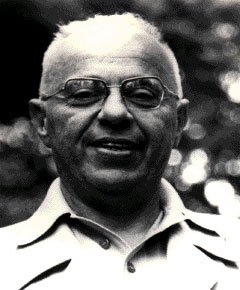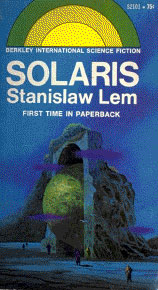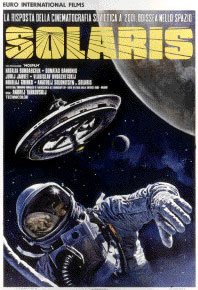|
Архив БВИ -> |
[Фантастика] [Филателия] [Энциклопудия] |

|
LEM, STANISŁAW

(1921– ) Polish writer, critic and polymath, winner of numerous awards including the 1973 Polish State Literary Award. Born in Lwow, he has described his childhood and adolescence charmingly in the autobiographical Wysoki zamek [«High Castle»] (1966 Poland). SL's study of medicine was interrupted in WWII by the Nazi occupation, when he worked as a car mechanic and welder; these experiences closely inform his first-written novel (not sf), Szpital Przemienienia (1957 Poland; trans William Brand as Hospital of the Transfiguration 1988 US). In 1946 he moved to Cracow, received his MD and wrote lyrical verse and essays on scientific methodology until he ran foul of the Soviet state's adulation of the Lamarckian biological theories of T.D.Lysenko (1898-1976) (EVOLUTION; PSEUDO-SCIENCE), and was research assistant in a scientific institute. Another «naturalistic» novel, Czas nieutracony [«Time Saved»] (1955), depicts an intellectual finding his way from solitude to sociopolitical meaning; it likewise was written in the 1940s. In the meantime SL had switched to sf; he has published over two dozen books so far, with translations into at least 30 languages and several million copies sold. His early sf novels, Astronauci [«The Astronauts»] (1951 Poland) and Oblok Magellana [«The Magellan Nebula»] (1955 Poland), are works of a beginner and limited by some of the conventions of «socialist realism», but are still interesting and contain a number of SL's constant themes (the threat of global destruction and militarism; human identity); their UTOPIAN naivety is shaped by the committed humanism characteristic of one axis of his work. His other axis, a black grotesque, appears in Dzienniki Gwiazdowe (coll 1957 Poland; gradually exp until by 1971 there were 14 «voyages» and 8 other Ijon Tichy stories; trans in 2 vols, the second of which is an expansion rather than simply a continuation of the first: vol 1 trans Michael KANDEL as The Star Diaries 1976 US, vol 2 trans Joel Stern and Maria Swiecicka-Ziemianek as Memoirs of a Space Traveler: Further Reminiscences of Ijon Tichy 1982 US), which develops into a parable-like expression.
The dozen years after the «Polish October» of 1956 were the golden noon of SL. He published 17 books: 5 sf novels; 10 partly overlapping books of sf short stories including the Pirx the Pilot cycle (see below), the «robotic fairy tales» of Bajki robotow (coll 1964 Poland) and the Trurl-Klapaucius or Cyberiad cycle (see below); Noc ksiezycowa (coll 1963 Poland), 1 sf play and 3 tv plays; nonfiction including the «cybernetic sociology» of Dialogi (1957 Poland); and the crown of SL's speculation and key to his fiction, Summa technologiae (1964 Poland), a breathtakingly brilliant and risky survey of possible social, informational, cybernetic, cosmogonic and biological engineering in Man's game with Nature.
Eden (1959 Poland; trans Marc E. Heine as Eden 1989 US), SOLARIS (1961 Poland; trans Joanna Kilmartin and Steve Cox [from French trans] 1970 US), Niezwyciezony (1964 Poland; trans Wendayne Ackerman [from German trans] as The Invincible 1973 US) and Opowiesci o pilocie Pirxie (coll 1968 Poland; trans Louis Tribarne as Tales of Pirx the Pilot 1979 US and Louis Tribarne and Magdalena Majcherczyk as More Tales of Pirx the Pilot 1982 US) use the mystery of strange beings, events and localities to educate their protagonists into understanding the limitations and strengths of humanity; SOLARIS was filmed as SOLARIS (1971). These parables for our age are fittingly open-ended: their tenor is that no closed reference system is viable in the age of CYBERNETICS and rival political absolutisms; the protagonists are redeemed by ethical and aesthetic insight rather than by hardware, abstract cognition or power – thence SL's strong, at times oversimplifying but salutary critique of English-language sf in his Fantastyka i futurologia (1970 Poland; excerpts trans with other material as coll Microworlds: Writings on Science Fiction and Fantasy 1985 US) for abusing the potentials of the new in gimmicks and disguised fairytales. His critique of equally anthropomorphic banalities in Soviet sf was effected by means of his immense popularity and liberating influence there. In between the two leviathans, SL used the experience of Central European intellectuals (ALBANIA, BULGARIA, CZECHOSLOVAKIA, HUNGARY, POLAND, ROMANIA, RUSSIA, SOVIET UNION) to fuse a bright, humanistic hope with a bitter, historical warning. This double vision subverts both the «comic inferno» approach and a deterministic utopianism by juxtaposing the black flickerings of the former with the bright horizons of the latter. Such a style of wit places SL in the contes philosophiques tradition of Jonathan SWIFT and VOLTAIRE. Even his grotesque stories, where no «cruel miracles» redeem the often disgusting limits of Man – such as Cyberiada (coll 1965 Poland; trans Kandel as The Cyberiad 1974 US), collecting many of the Trurl-Klapaucius stories – are informed by such humanizing fun, black SATIRE or allegorical iconoclasm.
Signs of an ideological dead-end, if not exhaustion, showed in about 1968, prompting further formal experimentation and a furious brilliance in SL's writing. In Glos pana (1968 Poland; trans Kandel as His Master's Voice 1983 US), SL's radical doubts about human self-determination and sovereignty, and therefore about possibilities of COMMUNICATION with other people (not to mention other civilizations), began threatening to distort the fictional form of the novel into solipsist musings, lectures and ideational adventure. His Master's Voice may have avoided that by a tour de force of narrative tone, but SL learned some lessons from this near-escape: he turned to a brilliantly innovative series of briefer second-order glosses at the borderland of fiction and treatise. Doskonala prozinia (coll 1971 Poland; trans Kandel as A Perfect Vacuum 1978 US) – mainly composed of reviews of nonexistent books, which simultaneously characterize and persiflage their targets – and Wielkosc urojona (coll 1973 Poland; trans Marc E. Heine with 2 pieces from Golem XIV [coll 1973] as Imaginary Magnitude 1984 US) range from thumbnail sketches of grisly futuristic follies to developments of Summa technologiae ideas on «intellectronics» (artificially heightened intelligence) and «phantomatics» (illusory existence). We find the latter in the most grimly hilarious and longest work of this period, a further Ijon Tichy story, «Ze Wspomnien Ijona Tichego: Kongres Futurologiczny» «Kongres Futurologiczny» (in coll Bezsennosc 1971 Poland; trans Kandel as The Futurological Congress 1974 US), as well as SL's deeply rooted though atheistic theologico-cosmogonic obsessions. Only in the 1980s, with the awkward but ferocious assault upon human cognitive pretensions contained in Fiasko (1986 Poland; trans Kandel as Fiasco 1987 US), did he return to novel-length structures.
SL's overflowing linguistic inventiveness, matching his controversial ideational plenty, is partly lost in translation, though the short stories assembled as Mortal Engines (coll trans 1977 US), The Cosmic Carnival of Stanislaw Lem (coll trans Kandel 1981) and One Human Minute (coll trans Catherine S. Leach 1986 US) reveal some of the exuberance of the writing. Nonetheless, SL's peculiar geopolitical vantage-point – enabling him effectively to transcend both cynical pragmatism and abstract utopianism – his stubborn warnings against static «final solutions», his position at the crossroads of major European cultures and ethics, joined to an intense internalization of problems from cybernetics and information theory, his fusion of dilemmas from ultramodern science and the oldest cosmogonic heresies, his dazzling formal virtuosity – all mark him as one of the most significant sf writers of our century, and a distinctive voice in world literature.
[DS]
Other works: Czlowiek z Marsa (1946 Poland, apparently only as episodes in a weekly); Sezam [«Sesame»] (coll 1955 Poland); Sledztwo (1959 Poland; trans Adele Milch as The Investigation 1974 US), ontological mystery rather than sf; Inwazja z Aldebarana ["Invasion from Aldebaran»] (coll 1959 Poland); Powrot s gwiazd (1961 Poland; trans Barbara Marszal and Frank Simpson as Return from the Stars 1980 US); Pamietnik znaleziony w wannie (1961 Poland; trans Michael Kandel and Christine Rose as Memoirs Found in a Bathtub 1973 US); Ksiega robotow ["The Book of Robots»] (coll 1961 Poland); Wejscie na orbite ["Getting into Orbit»] (coll 1962 Poland), essays on technology and fiction; Polowanie ["The Hunt»] (coll 1965 Poland); Ratujmy kosmos (coll 1966 Poland); Opowiadania (coll 1969 Poland); Rozprawy i szkice (coll 1974 Poland), essays on literature, sf and science; Katar (1977 Poland; trans anon as The Chain of Chance 1978 UK); Wisja Lokalna [«The Scene of the Crime»] (1982), an Ijon Tichy novel; Prowokacja [«Provocation»] (1984 Poland); Pokoj na Ziemi (1987 Poland; trans Elinor Ford with Michael Kandel as Peace on Earth 1994 US); Ciemnosc i plesn [«Darkness and Mildew»] (1988 Poland).
About the author: «To My Readers» by Stanislaw Lem, Poland 5, 1973; «Language and Ethics in Solaris» by Edward Balcerzan, Science-Fiction Studies: Selected Essays on Science Fiction 1973-1975 (1976) ed R.D. MULLEN and Darko SUVIN; «Stanislaw Lem, Rationalist and Sensualist» by Jerzy Jarzebski, SCIENCE-FICTION STUDIES July 1977; «Lem in Review (June 2238)» by Michael KANDEL, Science-Fiction Studies Mar 1977; «Stanislaw Lem on Men and Robots» by Kandel, EXTRAPOLATION Dec 1972; New Worlds for Old (1974) by David KETTERER; «European SF» by Ursula K. LE GUIN, Science-Fiction Studies Spring 1974; «The Open-Ended Parables of Stanislaw Lem and SOLARIS» by Darko Suvin, afterword to SOLARIS (trans 1970) and rev for 1976 edn; Stanislaw Lem (1985) by Richard E. Ziegfeld; special SL issue of Science Fiction Studies (vol 13, part 3, whole #4, 1986).
See also: ALIENS; ASTRONOMY; AUTOMATION; CONCEPTUAL BREAKTHROUGH; CRITICAL AND HISTORICAL WORKS ABOUT SF; DISCOVERY AND INVENTION; HUMOUR; ISLANDS; LIVING WORLDS; MACHINES; METAPHYSICS; PERCEPTION; PHYSICS; ROBOTS; SCIENCE FICTION WRITERS OF AMERICA; SPACE HABITATS; SPACESHIPS; SUPERNATURAL CREATURES.


This long, ambitious rendering of Lem's metaphysical novel is regarded by some as one of the finest sf films made; a minority sees it as tediously slow-moving. S changes the emphasis of the story from the intellectual to the emotional, partly by restructuring the narrative, which in the film is framed by elegiac and nostalgic sequences at the country house of the young space-scientist hero's parents, focusing on the scientist's relationship with his father; the opening passage is on Earth, the closing passage on Solaris's recreation of Earth. The main action is set on a space-station hovering above the planet Solaris, whose ever-changing ocean is thought to be organic and sentient. The protagonist finds the station in disrepair and his colleagues demoralized by the materialization of «phantoms» (quite real and solid) of their innermost obsessions; soon he is himself haunted by a reincarnation of his suicided wife. These phantoms may be an attempt by Solaris to communicate. Horrified, he kills the phantom wife, but a replica arrives that night. Ultimately he recognizes that, no matter what her source, she is both living and lovable; but while he sleeps she connives at her own exorcism. Solaris remains an enigma. The philosophical questions about the limits of human understanding are not put so sharply as in the book, but the visual images, despite occasionally mediocre special effects, are potent – haunting leitmotivs of water, sundering screens, technology and snow.
[PN]
See also: MUSIC; RUSSIA; SPACE HABITATS.
// The Multimedia Encyclopedia of Science Fiction. Copyright 1995 by Grolier Electronic Publishing, Inc.
// The Encyclopedia of Science Fiction and updated text copyright 1993, 1995 by John Clute and Peter Nicholls.
|
Архив БВИ -> |
[Фантастика] [Филателия] [Энциклопудия] |

|
© 1995 Suvin Darko, Nicholls Peter, текст